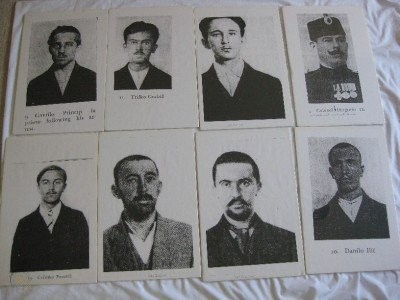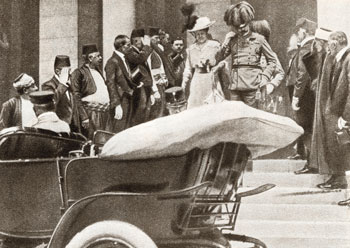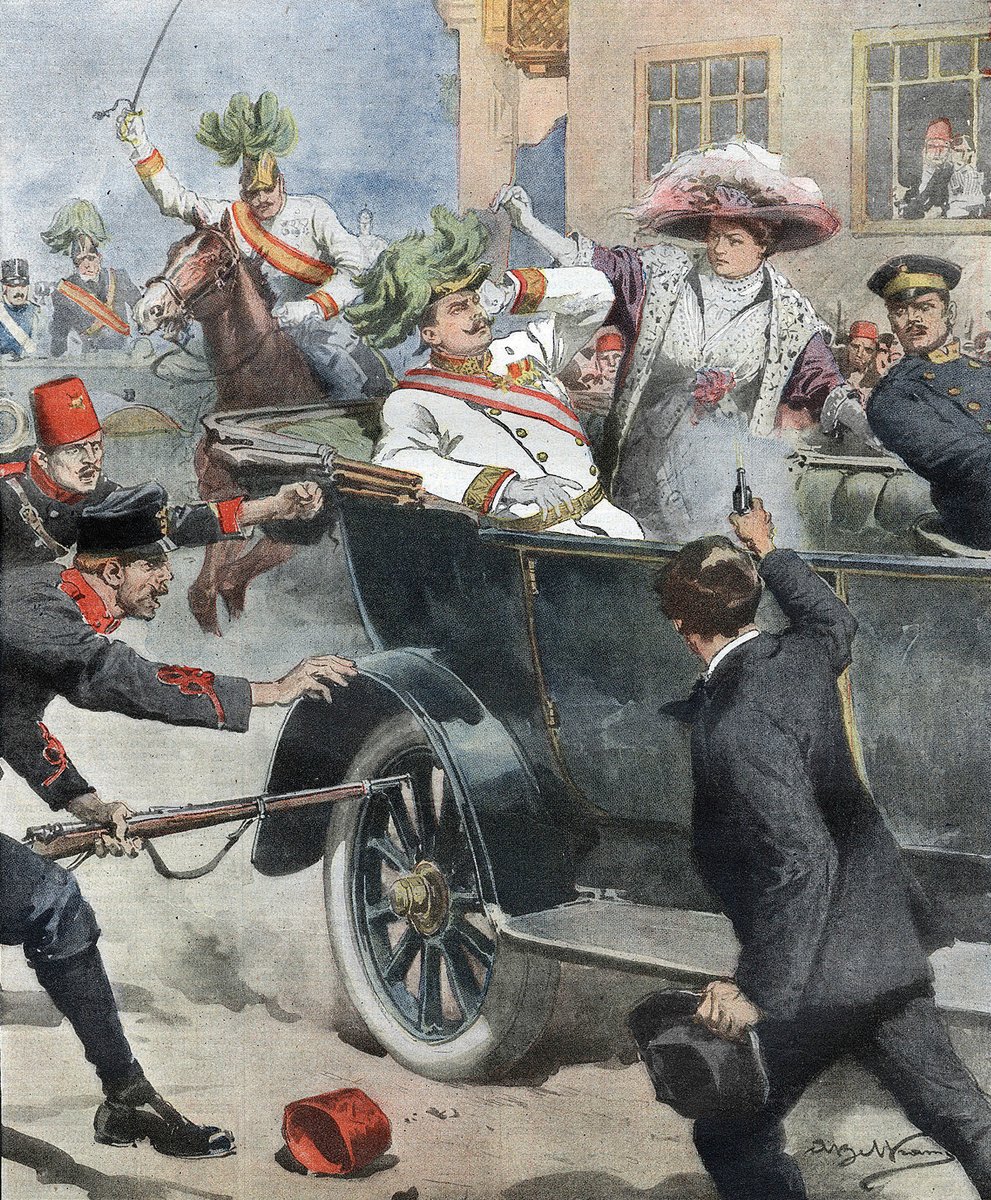Mere days of inaction can lead to catastrophic consequences.
Let’s revisit 30 days in 1914 that could have — with intergovernmental unity — avoided WWI.
Thread:
On 28th June 1914, Archduke Franz Ferdinand and his wife were assassinated in Serbia.
1/
Let’s revisit 30 days in 1914 that could have — with intergovernmental unity — avoided WWI.
Thread:
On 28th June 1914, Archduke Franz Ferdinand and his wife were assassinated in Serbia.
1/
The group behind the killings was The Black Hand Secret Society, formed by Dragutin Dimitrijevi´c, the Serbian Chief of Intelligence.
His goal: create a covert terrorist group using violence to achieve a Greater Serbian state.
2/
His goal: create a covert terrorist group using violence to achieve a Greater Serbian state.
2/
In 1914 they had only about 2,500 members.
Serbian Military Intelligence Officer Captain Tankositch recruited Gavrilo Princip, Nedjelko Cˇabrinovi´c and Trifko Grabez to the Black Hand to carry out the assassination of the heir to the throne of Austria-Hungary.
3/
Serbian Military Intelligence Officer Captain Tankositch recruited Gavrilo Princip, Nedjelko Cˇabrinovi´c and Trifko Grabez to the Black Hand to carry out the assassination of the heir to the throne of Austria-Hungary.
3/
On their visit to Sarajevo, Cˇabrinovi´c threw a grenade at the Archduke’s passing carriage.
It bounced off, exploded under a car behind them, and the Archduke remained unharmed.
4/
It bounced off, exploded under a car behind them, and the Archduke remained unharmed.
4/
Concerned for the victims of the bomb attack, the Archduke and his wife diverted to immediately visit them in the hospital.
As they left, rerouting down a narrow street, the carriage stalled.
Princip, hiding in a coffee shop, spotted the Archduke.
5/
As they left, rerouting down a narrow street, the carriage stalled.
Princip, hiding in a coffee shop, spotted the Archduke.
5/
Princip leapt forward and climbed into the carriage.
He fired point-blank at the Archduke, killing he and his pregnant wife, Sophia.
6/
He fired point-blank at the Archduke, killing he and his pregnant wife, Sophia.
6/
Austria-Hungary’s Foreign Minister, Count Berchtold, wanted proof of responsibility before démarche against Serbia for the murders.
After two weeks Serbia had provided none, despite the arrest of Black Hand member Gavrilo Princip.
7/
After two weeks Serbia had provided none, despite the arrest of Black Hand member Gavrilo Princip.
7/
The Austro-Hungarian government kept demanding the extradition of the Black Hand terrorists to Vienna to stand trial. The Serbian prime minister refused.
FM Berchtold went to Kaiser Wilhelm with Serbia’s response.
8/
FM Berchtold went to Kaiser Wilhelm with Serbia’s response.
8/
On 23rd July 1914, the Kaiser gave Serbia 48 hours to implement 10 demands for punishment to the killers — or risk war.
Serbia, backed by Russia, responded within 5 minutes of the deadline, accepting 7 of 10 demands. It was unsatisfactory.
9/

Serbia, backed by Russia, responded within 5 minutes of the deadline, accepting 7 of 10 demands. It was unsatisfactory.
9/

Meanwhile, British Minister of Munitions David Lloyd George* assured Germany and Austria-Hungary that Britain wouldn’t intervene in the matter. Excellent relations would continue and Britain would stand down in any confrontation.
[* More on DLG below]
10/
[* More on DLG below]
10/
Germany counted upon Britain staying out; it conveniently left France vulnerable.
(France long claimed the mainly Germanic-speaking border territory of Alsace-Lorraine as hers, annexed by the German Empire in 1871 after the Franco-Prussian war.)
11/
(France long claimed the mainly Germanic-speaking border territory of Alsace-Lorraine as hers, annexed by the German Empire in 1871 after the Franco-Prussian war.)
11/
‘Peace at any price’ was the newspapers’ cry in support of non-intervention.
British news clippings reached Kaiser Wilhelm, and German newspapers were jubilant at the British position: ‘gut’ and ‘ausgezeichnet’ they printed.

12/
British news clippings reached Kaiser Wilhelm, and German newspapers were jubilant at the British position: ‘gut’ and ‘ausgezeichnet’ they printed.

12/
On 28th July, Austria-Hungary declared war on Serbia.
Tsar Nicholas II of Russia urgently telegramed Kaiser Wilhelm and suggested the dispute be sent to The Hague to avoid conflict.
13/
Tsar Nicholas II of Russia urgently telegramed Kaiser Wilhelm and suggested the dispute be sent to The Hague to avoid conflict.
13/
Rejecting pleas for calm, Germany declared war on Russia on the 1st of August.
The next day, Germany crossed into Luxembourg.
But Britain’s Lloyd George brushed off as a “mere trifle” of an incident.
14/
The next day, Germany crossed into Luxembourg.
But Britain’s Lloyd George brushed off as a “mere trifle” of an incident.
14/
Germany then telegraphed France demanding neutrality in the Serbian matter.
The Kaiser also sent a request to Belgium for free passage to stop the French from crossing into Germany.
Belgium rejected the Kaiser.
15/
The Kaiser also sent a request to Belgium for free passage to stop the French from crossing into Germany.
Belgium rejected the Kaiser.
15/
On the 3rd August, Germany declared war on France.
On the 4th, Germany entered Belgium.
Britain then reversed its policy of peace and declared war against Germany, bound by its pledge of allegiance to France.
16/
On the 4th, Germany entered Belgium.
Britain then reversed its policy of peace and declared war against Germany, bound by its pledge of allegiance to France.
16/
Germany then declared war on Russia, France, and Belgium.
Britain declared war on Germany and Turkey.
France, Britain, and Montenegro declared war on Austria-Hungary.
Italy fought Austria, Germany and Turkey.
17/
Britain declared war on Germany and Turkey.
France, Britain, and Montenegro declared war on Austria-Hungary.
Italy fought Austria, Germany and Turkey.
17/
Japan declared war on Germany.
Italy, Britain and France went to war with Bulgaria.
Romania and Albania fought Austria.
Germany fought Portugal and Romania.
Turkey fought Romania.
18/
Italy, Britain and France went to war with Bulgaria.
Romania and Albania fought Austria.
Germany fought Portugal and Romania.
Turkey fought Romania.
18/
The US declared war on Germany.
Austria and Bulgaria declared war on the US.
China, Cuba, and Panama entered against Germany.
19/
Austria and Bulgaria declared war on the US.
China, Cuba, and Panama entered against Germany.
19/
China declared war on Austria towards its end, and lastly Brazil declared war on Germany (26th October 1917).
But there is a side note to this history — the role of a nationalistic media.
20/
But there is a side note to this history — the role of a nationalistic media.
20/
Lord Northcliffe’s right-wing newspaper propaganda campaign had relentlessly attacked Prime Minister H.H. Asquith, calling for a new government altogether.
And by 1916, Lloyd George wanted to replace Asquith.
21/
And by 1916, Lloyd George wanted to replace Asquith.
21/
Lloyd George demanded control of Britain’s war policy.
Asquith refused.
Lloyd George resigned.
As did Asquith.
22/
Asquith refused.
Lloyd George resigned.
As did Asquith.
22/
The British government fell on 5th December 1916.
King George V asked Lloyd George to step in on the 7th.

The media had successfully managed to manipulate the leadership of Britain, and thus the course of war.
23/
King George V asked Lloyd George to step in on the 7th.

The media had successfully managed to manipulate the leadership of Britain, and thus the course of war.
23/
Five days later, Germany conveyed her willingness to negotiate for peace with Lloyd George.
Lloyd George rejected the move.
24/
Lloyd George rejected the move.
24/
Although the assassination caused Austria-Hungary to strike first...
...overconfident powers, super-patriotism, a lack of foresight, overconfidence, the flexing of military might, and empire-expansion led to utter madness.
It did not have to happen.
25/
...overconfident powers, super-patriotism, a lack of foresight, overconfidence, the flexing of military might, and empire-expansion led to utter madness.
It did not have to happen.
25/
A few sources:
The Man Who Didn’t Win The War: An Exposure of Lloyd Georgism’, Centurion (London: National Review Collections, 1923)
Herr von Below Saleske, German Ambassador to Belgium, classified letter to M. Davignon, Belgian Minister for Foreign Affairs, August 2nd 1914
The Man Who Didn’t Win The War: An Exposure of Lloyd Georgism’, Centurion (London: National Review Collections, 1923)
Herr von Below Saleske, German Ambassador to Belgium, classified letter to M. Davignon, Belgian Minister for Foreign Affairs, August 2nd 1914
Everyman’s Dictionary of Dates, (London: J.M. Dent & Sons, Ltd.,1964)
Deutschen Dokumente zum Kriegsausbruch, 2, pp 104-116
Fin.
Deutschen Dokumente zum Kriegsausbruch, 2, pp 104-116
Fin.
@threadreaderapp unroll
On 1st tweet:
Sarajevo & Bosnia-Herzegovina were part of Austria-Hungary (annexed 1878). Bosnian Serbs, backed by Serbia, wanted Sarajevo in a greater Serbia.
Princip was considered a Bosnian Serb. At his trial he said, "I am a Yugoslav nationalist".
Sarajevo & Bosnia-Herzegovina were part of Austria-Hungary (annexed 1878). Bosnian Serbs, backed by Serbia, wanted Sarajevo in a greater Serbia.
Princip was considered a Bosnian Serb. At his trial he said, "I am a Yugoslav nationalist".
PS2: First tweet should have read 'Sarajevo' not 'Serbia'.

 Read on Twitter
Read on Twitter








![Meanwhile, British Minister of Munitions David Lloyd George* assured Germany and Austria-Hungary that Britain wouldn’t intervene in the matter. Excellent relations would continue and Britain would stand down in any confrontation.[* More on DLG below]10/ Meanwhile, British Minister of Munitions David Lloyd George* assured Germany and Austria-Hungary that Britain wouldn’t intervene in the matter. Excellent relations would continue and Britain would stand down in any confrontation.[* More on DLG below]10/](https://pbs.twimg.com/media/ErfkpPIW8AUu0g8.jpg)






